To paraphrase Henry David Thoreau, "What is the use of a tent if you don't have a decent planet to put it on?"
From a cotton cap to a super-technical storm shell, every product has an environmental and social footprint. By understanding how outdoor brands try to minimize that footprint and produce products more sustainably, you can make a more informed decision about how to invest your gear and clothing dollars.
In this article, we'll give you an overview of some of the most relevant sustainability topics in the outdoor industry. By considering the following attributes when you shop, you can reduce your personal impact on the environment, human health and the
animals and workers who make your outdoor gear and clothing. When you shop on REI.com, you will often have the option of selecting one of the following sustainability attributes:
- Animal welfare
- Fair Trade
- Organically grown cotton
- bluesign®
- Recycled materials
- Forest Stewardship Council™
Also, we'll give you tips so you can extend the lifespan of your existing clothing and gear so you can save the resources that go into making new stuff.
REI Product Impact Standards
REI has established the REI Product Impact Standards, which apply to all brands and products sold at the co-op. These standards outline our expectations for how key environmental, social and animal welfare impacts are managed by all of our brand partners. The standards also identify preferred attributes—the most credible, relevant and meaningful features that support reduced impacts across our product offering. We encourage brand partners to use these impact standards for their products, including standards covered in this article. Look for products with these features while shopping at REI to help support better ways of making gear.
Animal Welfare
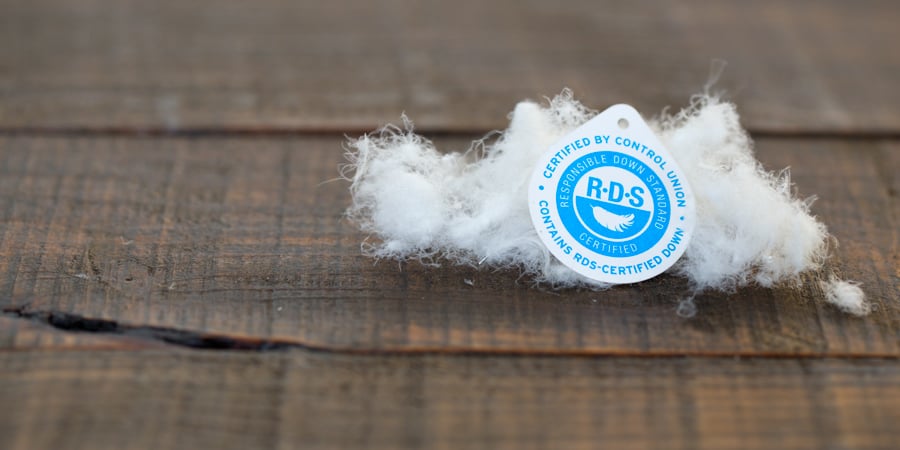
Whether it's our down sleeping bag, our wool base layer or our leather hiking boots, most of us have some animal-derived products in our gear closet. If you want to ensure that the animals were well-treated and/or raised in a way that helps sustain a healthy environment, then look for some of these key animal-related standards:
- Responsible Down Standard (RDS): This certification safeguards the well-being of the ducks and geese that provide the down and feathers found in gear like jackets, sleeping bags, booties and more. It also bans inhumane practices, such as live plucking and force feeding.
- Responsible Wool Standard (RWS): When you see this certification, you know that sheep that produced the wool in your product were raised on farms that operate according to leading animal welfare standards.
- Recycled down and wool: Using these reduces the gear and apparel industry's reliance on virgin sources of those materials, reducing impact on animals—and the climate, because animal husbandry can be carbon-intensive.
- Leather Working Group (LWG): While this group doesn't monitor humane treatment of animals, it does monitor the environmental management practices of producers of leather for footwear and other products. LWG auditors give leather suppliers a grade of "Gold," "Silver," "Bronze" or "Pass" for their environmental stewardship practices.
- Vegan and organic: These familiar standards relate to outdoor food products; in addition, some synthetic footwear products are classified as vegan.
For full details about what these standards mean, read Animal Welfare and Outdoor Gear.
Fair Trade
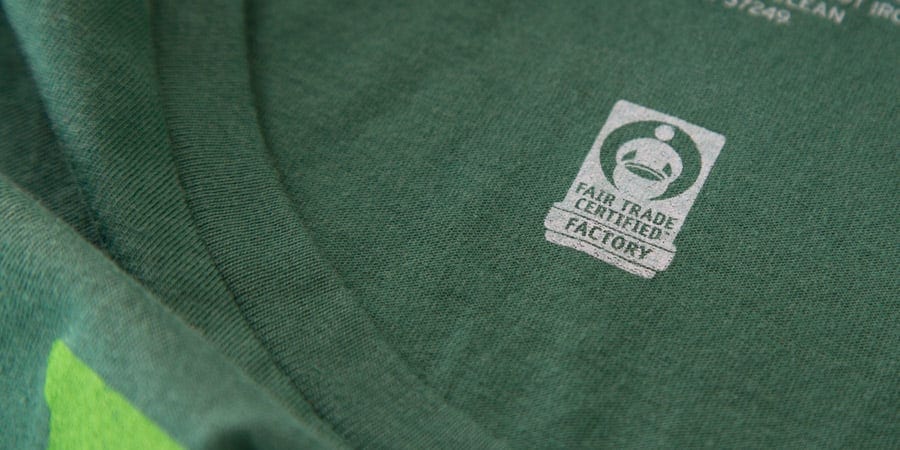
Perhaps most well-known in the coffee and food realm, Fair Trade principles have expanded to apparel and a growing range of other products. Fair Trade is a broad term for programs that promote more equitable livelihoods and safe working conditions for farmers and workers. Fair Trade standards also promote environmental protection and community empowerment. A number of organizations oversee various credible and robust certification systems, including Fair Trade USA, Fairtrade International and Fair for Life.
At REI you'll most commonly see the Fair Trade Certified™ mark overseen by Fair Trade USA. It can be applied to a product's ingredients or materials. It can also note that the factory or sewing process complies with Fair Trade principles. A product can earn the full certification when both the materials and the process of putting the product together meet Fair Trade USA standards.
For a lengthier look at the standard and levels of certification, read Fair Trade Food and Clothing Basics.
Organically Grown Cotton
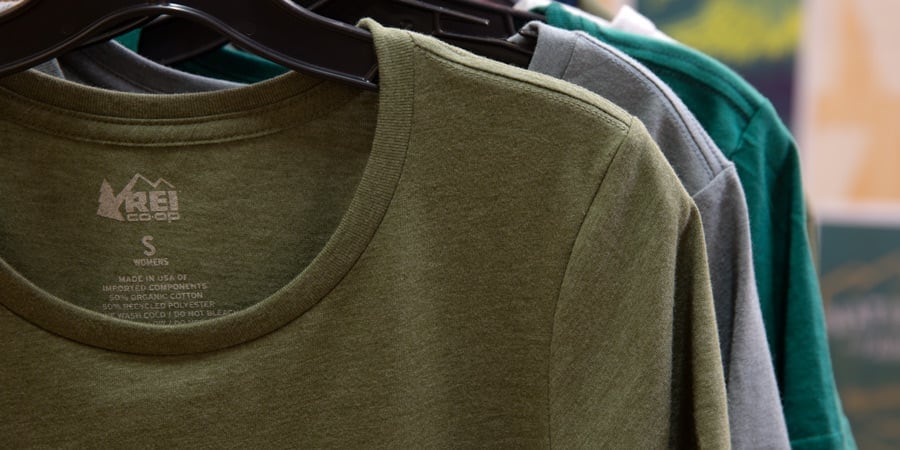
Conventional cotton production can have a significant impact on the land where that cotton is grown. Organically grown cotton has a smaller environmental footprint: Synthetic pesticides and herbicides are not allowed. Farms that grow organic cotton are also required to follow practices that promote the health of soil and water, and promote water and energy conservation. Carbon emissions for organically grown cotton are typically far lower than they are for conventionally produced cotton.
Whenever you shop for cotton products, look for labels, packaging or online product information that indicates the item's material came from a farm that complies with organic-cotton growing practices.
For a deeper dive into cotton production and sustainability, read What is Organically Grown Cotton?
bluesign®
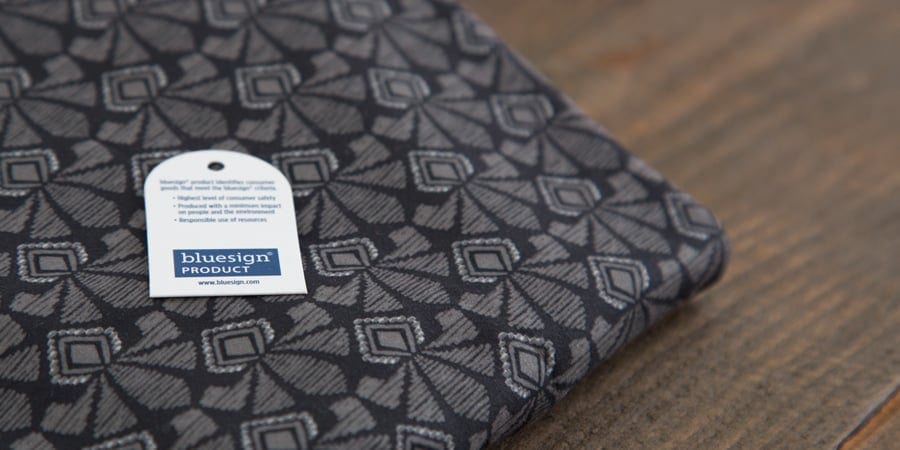
The bluesign® system operates at every step in the supply chain to prevent harmful substances from entering the manufacturing process. The bluesign® team includes experts in chemistry and textile production, as well as a robust system of factory auditing and certification. Key areas of emphasis include the following:
Resource use: The bluesign® team consults with factories to help them operate more efficiently, which reduces overall water, energy and chemical use.
Occupational health and safety: By working with manufacturers to eliminate hazardous chemicals and implement safety practices, bluesign® helps protect workers from exposure to chemicals.
Water and air emissions: Factories approved by bluesign® must meet stringent standards for pollution control.
Consumer safety: The bluesign® system also features the world's strictest chemical safety requirements for textiles.
bluesign®-certified materials and products: The bluesign® logo on a material or product tells you that environmental, health and safety issues have been thoroughly addressed during its creation. The bluesign® group works with a growing roster of top outdoor brands, so you'll see its certification on more and more products in the future.
Look for the bluesign® logo and the words "bluesign®-certified material" or "bluesign® product" when you shop for clothing or textile-based gear like packs. On REI.com, look for the following descriptions: "Contains materials that meet bluesign® criteria" or "Product meets bluesign® criteria."
For more details about what the standard means, read What is bluesign®?
Recycled Materials
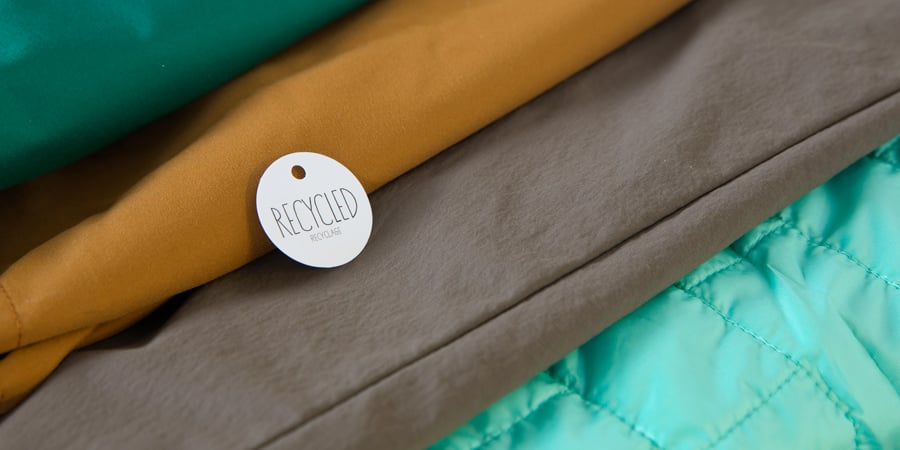
Recycling plastic bottles to produce polyester for clothing and gear is perhaps one of the more well-known advances in product sustainability. You'll find recycled polyesters in products ranging from base layers to outerwear to backpacks—any product where you might otherwise see virgin polyester. Sometimes brands will state how many bottles went into a given product.
Though not as prevalent as polyester, recycled nylon is also common, showing up in a similarly broad range of clothing and gear.
Using recycled materials lessens the need for raw materials, often requires less energy and water than extracting virgin materials, and helps cut down on the amount of plastic and other materials that end up in landfills.
For more details, read Understanding Recycled Materials in Outdoor Clothing and Gear.
Shop Recycled-Materials Products
Forest Stewardship Council™ (FSC)
The FSC certification tells you that wood and wood-based products, including paper, natural rubber and cellulosic fibers such as lyocell were produced by following rigorous standards of responsible forest management. The FSC certification covers a broad range of concerns, including environmental stewardship, legal and regulatory compliance, Indigenous people's rights and the social and economic well-being of workers and communities.
The following are FSC labels you might see:
- FSC 100%: All wood, paper and/or other wood-based materials within the product come completely from FSC-certified forests.
- FSC Recycled: All wood, paper and/or other wood-based materials in a product come from recycled or reclaimed (re-used) material.
- FSC Mix: All wood, paper and/or other wood-based materials within the product come from FSC-certified material, recycled material or controlled wood. "Controlled wood" minimizes the risk of using wood products from unacceptable sources, including wood that was harvested in forests where high conservation values are threatened by management, or from natural forests that were converted to non-forest uses.
Look for the FSC logo when shopping for products made of wood or wood-based materials. FSC also certifies wood-based product packaging, so look for the logo there as well.
For more details, read What FSC Certification Is and Why You Should Look for It.
Product Sustainability Tips
Repair Your Gear: The longer your gear lasts, the longer you can put off replacing it. Read and follow product care and repair instructions, look for products that have repair kits available and seek out reputable services like Rainy Pass Repair.
To learn more about steps you can take, check out all of our Gear Care & Repair articles. The following are just a few of the articles you can find:
- How to Repair a Tent
- Sleeping Bag Care
- Rainwear: Durable Water Repellent (DWR) Care
- Bike Maintenance Basics
- Ski and Snowboard Base Repair
- Climbing Rope Care
Sell, trade in and buy used gear: Gear no longer wanted by one person can often meet someone else's needs. It's a win for the person who gets back space in their gear closet, the person who saves money on their gear purchase—and for the planet that doesn't get its virgin resources tapped to keep those two folks happy. If you're an REI member, you can shop for used gear on REI.com and trade in your used gear.
Look for third-party certifications: Most of the standards mentioned in this article are overseen by independent third-party organizations. That setup helps ensure that the standards are credible and rigorous and that there is a verification scheme in place that monitors compliance with the standards. Be wary about vague terms like "eco" or "green" whenever you can't find supporting details about a specific sustainability standard that underlies that claim.
Read the sustainability reports from outdoor brands: Many brands produce these reports, where you can often find up-to-date details about their sustainability practices, including third-party certifications they embrace. You can also learn about a brand's other initiatives on behalf of the outdoors.
Shop Gear with Sustainability Features
Related Articles
Read the REI Stewardship Report for details on REI Co-op's sustainability efforts.


